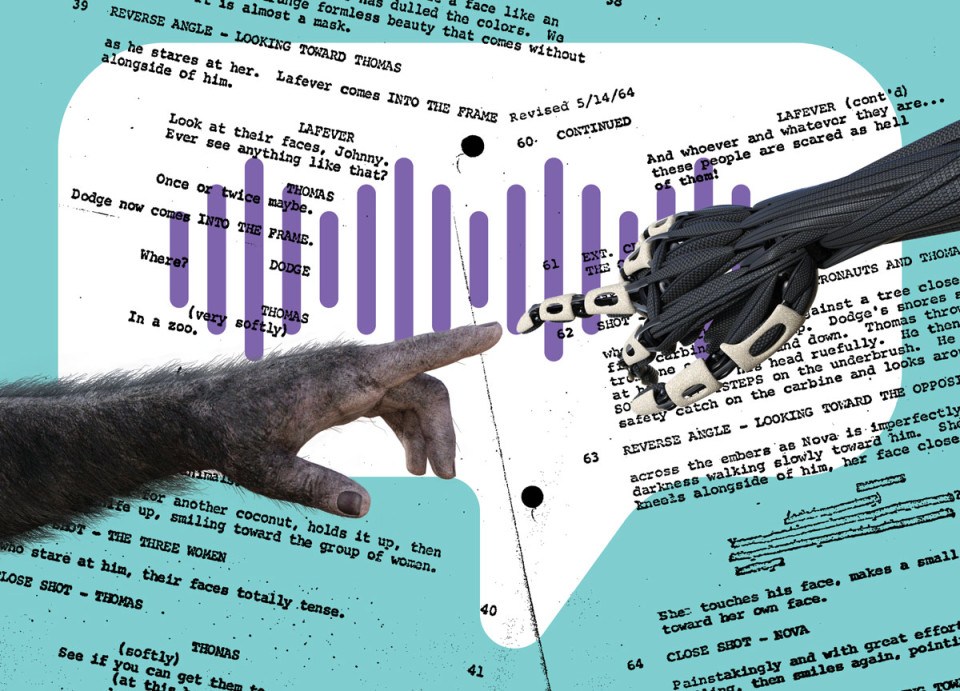One Philly Theater Company Uses ChatGPT to Create Its New Show
Planet of the Bored Apes is the result of a collaboration between real people and a chatbot.

Can ChatGPT write a play? / Illustration by Jamie Leary. Image of hands by Victor Habbick Visions via Science Photo Library/Getty Images
When the lights go up later this month on Planet of the Bored Apes, the latest play from experimental Philly theater company Die-Cast, what you see in front of you will be the result of countless hours of work by director Brenna Geffers and her team of writers and creative personnel — and oh yes, a chatbot.
You know, chatbot. That artificial-intelligence technology that allows companies to “chat” with you on their websites without any human involvement on their end. Controversy erupted over the technology after it became available to us commoners in November 2022 for free, thanks to the release of ChatGPT.
“Kids are going to use it to write their term papers!” some teachers warned. “They’re going to have ChatGPT replace journalists!” my peers worried.
(In point of fact, digital-media behemoth BuzzFeed says it will use ChatGPT to create some content. But don’t worry: A competent journalist with blood flowing through his veins wrote this article. Even if it might not seem that way.)
But back to Planet of the Bored Apes. The show is an anthology of works about cryptocurrency, the blockchain, NFTs, chatbots, and other ways that artificial intelligence has seeped into our lives. So why not employ a chatbot as a writer and collaborator, I guess.
“Some of the text is written by ChatGPT,” explains Geffers, who co-founded Die-Cast in fall 2017, back when TikTok was a toddler and long before your Aunt Edna called you way too early on a Sunday morning to ask you to explain this NFT thing. “When you’re working on something like developing a show, giving your writers prompts is just part of the process. And in this case, I decided to give ChatGPT the same prompts and see what comes out the other end. It’s fun playing with the bot. You kind of get better at giving it prompts, the same way there’s a learning curve giving live actors prompts.”
A lot of people are rightly suspicious of how AI can impact the arts. And it certainly does raise questions about authorship and authenticity that we haven’t figured out yet. But it can also be fun and lead us in directions we never expected to go in.”
Geffers even used an AI-driven art program (the kind that is, concerningly, able to rip off Picasso in mere seconds) to create the promotional graphics for the show — a bored-looking primate sitting on the stern of a yacht with a nondescript metropolis skyline in the background — and intends to have some kind of live, interactive ChatGPT element during performances, giving audiences the opportunity to interact not just with the live actors but with their AI compatriots, too.
Geffers isn’t worried that AI is going to replace her or her colleagues anytime soon. But she does concede that technology has already eliminated some humans from stage production. For one example, look at the “smart lighting” that has the capacity to follow an actor around onstage, a task that once required a human behind a follow spot, or at least a person with a hand on a joystick.
“A lot of people are rightly suspicious of how AI can impact the arts,” she says. “And it certainly does raise questions about authorship and authenticity that we haven’t figured out yet. But it can also be fun and lead us in directions we never expected to go in. And isn’t it our primary job as artists to wonder about things, to explore that which is unknown?”
If this all sounds a bit heady to you, have no fear. Part of Die-Cast’s mission is to inhabit spaces that aren’t typically considered performative, so this show’s venue is an event space at the popular German beer hall Brauhaus Schmitz. And you can buy beer there. Real beer. Maybe after a few hoppy brews, all this NFT stuff will finally come into focus. Or not.
See Planet of the Bored Apes March 27th and 30th at Brauhaus Schmitz.
Published as “AI Goes to the Theater” in the March 2023 issue of Philadelphia magazine.


